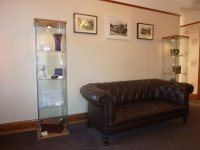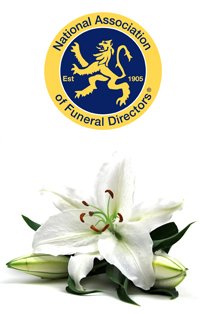The Next Step
What To Do Next

When death occurs at home
In this instance it is advisable to contact the deceased's doctor in order for them to certify death. If the death occurred outside the surgery hours you will be given the option to go through to an out of hours doctors service.
Once the doctor has attended, the deceased can be taken into our care we are available for this 24hours a day 365 days of the year.
The deceased own doctor will issue a medical certificate stating the cause of death, this will be made available for collection from the surgery. The medical certificate will be required to enable the death to be registered.
If the doctor attending the deceased is unable to ascertain the cause of death, or the deceased has not seen a doctor in the previous 14 days the doctor may in some cases refer the death to the local coroner, if this situation occurs the deceased will be transferred to the local hospital, for this part you can request that the deceased is collected by S. Carter & Son.
When death occurs in a nursing home
You may have been asked at the time of entering the nursing home who your selected funeral director is, if this was the case the nursing home will telephone your funeral director to arrange collection of the deceased again we are available for this 24hours a day 365 days of the year.
The role of the Coroner
Coroners are officers appointed by the Council to investigate any sudden or unexplained death. They are independent of both Local and Central Government and are required to act in accordance with laid down rules and procedures. Most Coroners have a team of people supporting them in their work.
When is a death reported to the Coroner?
- When the deceased has not been treated by a doctor during their illness;
- When the doctor attending the deceased did not see them within 14 days before they died or after death;
- When the death occurred during an operation or before recovery from the effect of an anaesthetic;
- When the death was sudden and unexplained or by suspicious circumstances;
- When the death may be due to an industrial injury or disease, or to accident, violence, neglect or abortion, or to any kind of poisoning; or
- When the death occurred in police custody or in prison.
How is a death reported to the Coroner
A death occurring in any of the above circumstances is usually reported to the Coroner by the police, or by a doctor called to the death if it was sudden or accidental. It may also be reported by a doctor who was treating the deceased if the death was unexpected. The Registrar may also report a death to the Coroner.
Once any death has been reported to the Coroner the Registrar cannot register the death until the Coroner's enquiries are complete. These enquiries can take some time so you will need to contact the Coroner before making the funeral arrangements.
What will the Coroner do?
The Coroner may be able to establish that the death was due to natural causes and that there is a doctor who is able to issue a Medical Certificate of Cause of Death. If this is the case then you will need to attend a Registration Office to register the death.
If the Coroner is unable to do so then he will arrange for the deceased to be taken to the local hospital where, as required by law, a post-mortem examination will be performed. (You do not have to use the Funeral Director who acts for the Coroner to carry out the funeral arrangements) This examination often shows that the death was due to natural causes and in such cases no inquest is required. The Coroner will inform you when he issues a document to allow you to attend a Registration Office to register the death.
If the Coroner establishes the death was not due to natural causes then he is obliged to hold an inquest.
What happens at an inquest?
The Coroner holds a medical/legal enquiry into the death of the deceased, but this is not a trial. The purpose of an inquest is to establish the identity of the deceased, when, where and how the death occurred and to establish the facts required by the Registrar. In some cases the Coroner will then adjourn the inquest and issue a form to allow the funeral to take place.
An inquest adjourned will be re-opened at a later date to determine the circumstances surrounding the death. This may involve witnesses being called, who are legally obliged to attend and may be penalised if they fail to do so.
How is the death registered after an inquest?
Once an inquest has been held the Coroner will send a report to the Registrar who will register the death.
What documents are then issued, and who to?
The Coroner will inform the Registrar of the name and the address of the person who should be notified that the death has been registered. The Registrar will send that person a form for Social Security purposes. This should be read and completed before returning to the local Department for Work and Pensions Office as soon as possible.
That person may then need to purchase some death certificates. Each certificate is a certified copy of the entry in the Death Register and costs £3.50 whilst in a current register or £7.00/£9.00 once the register has been completed. Certificates may be required for Bank and savings Accounts, Insurance or Pension schemes and Car Registration.
Where there is a delay between the death and the holding of an inquest it is possible for the Coroner to issue interim death certificates if requested. Contact the Coroner responsible for the inquest.
Link to Coroners Service Website
http://www.essex.gov.uk/Births Ceremonies Deaths/coroner-service/Pages/Default.aspx
Registering a death
In most cases you will need to register the death within five days, unless a coroner is investigating the circumstances of the death.
Registrations in Essex can take place at any office in the county rather than in the location where the death occurred, with the exception of Southend-on-Sea and Thurrock as they are unitary authorities and as such are not part of the Essex County Council registration service.
Essex County Council centralised appointment booking service for registrations:
0845 603 7632 appointments can be booked from 8.00am to 8.00pm Monday to Friday and from 9.00am to 12.00 noon on a Saturday. Appointments are still able to be booked through the local offices, although office opening hours and telephone line capacity is more restrictive.
Who can register a death:
- A relative:
- A person present at the death:
- A legally registered civil partner:
- Someone who lives in the house where the person died:
- A person arranging the funeral with the funeral director:
- A responsible person from the hospital or home where the person died:
Information needed for registration:
- Medical certificate of cause of death:
- Date and place of death:
- Full names of the deceased at the time of death and any other names which may have been used:
- Usual home address and postcode:
- Date of birth (for spouse):
- If the person who died was a married woman or widow her maiden surname:
- Occupation of the deceased:
- The full name and occupation of the spouse (for a married or widowed woman):
- Either the National Health Service Number if known or the medical card if available:
- Details of any pension or allowance from public funds:
It would also help the registrar if you could bring the birth certificate for the deceased. Once the registration is complete you will be asked to sign the entry. It is very important that the information recorded is accurate.
The registrar will give you:
- A green form to be given to the funeral director:
- A white BD8 form to be completed and sent by you, with any benefit or pension details to the Department of Work and Pensions.
You can also obtain certified copies of the death entry (the death certificate) at the time of registration. You will need to produce a death certificate when you are sorting out the finances of the person who has died (for example with banks, building societies and insurance companies).
Registration of births and deaths in the Basildon District:
Basildon:
Basildon Centre, St Martins Square, Basildon, SS14 1DL.
Telephone: 01268 526535
An appointment system operates
Hours of attendance
Monday to Friday 9.00am. to 1.00pm - 2.00pm. To 5.00pm
Billericay:
Burghstead Lodge, 143 High Street, Billericay, CM12 9AB.
Telephone: 01268 526535 (Basildon Office)
Email: brentwood.ro@essex.gov.uk
An appointment system operates
Hours of attendance
Tuesday and Thursday 9.00am to 5.00pm
Registration of births and deaths in the Brentwood District:
1 Seven Arches Road, Brentwood, CM14 4JG.
Telephone: 01277 233565
Email: brentwood.ro@essex.gov.uk
An appointment system operates
Hours of attendance
Monday to Friday9.00am. to 1.00pm - 2.00pm. To 5.00pm
Local register offices in the Chelmsford District
17 Market Road, Chelmsford, CM1 1GF
Telephone: 01245 430700
Email: chelmsford.ro@essex.gov.uk
An appointment system operates
Hours of attendance
Monday to Friday 9.00a.m to 5.00pm
Saturday 9.00a.m to 11.30a.m
Local register offices for the Castle Point and Rochford Districts:
Rayleigh:
The Robing Room, District Council Offices, Hockley Road, Rayleigh, SS6 8EB
Telephone: 01268 776362
Email: Rayleigh.ro@essexcc.gov.uk
An appointment system operates
Hours of attendance
Monday to Friday 9.30a.m to 12 noon
Benfleet:
Castle Point Borough Council Offices, Kiln Road, Thundersley, Benfleet, SS7 1TF.
Telephone: 01268 361350
Email: castlepointandrochford.ro@essex.gov.uk
An appointment system operates
Hours of attendance
Monday to Friday 9.00a.m to 5.00p.m
Local register offices in the Southend-on-Sea District:
Civic Centre, Victoria Avenue, Southend-on-Sea, SS2 6ER
Telephone: 01702 534350
An appointment system operates
